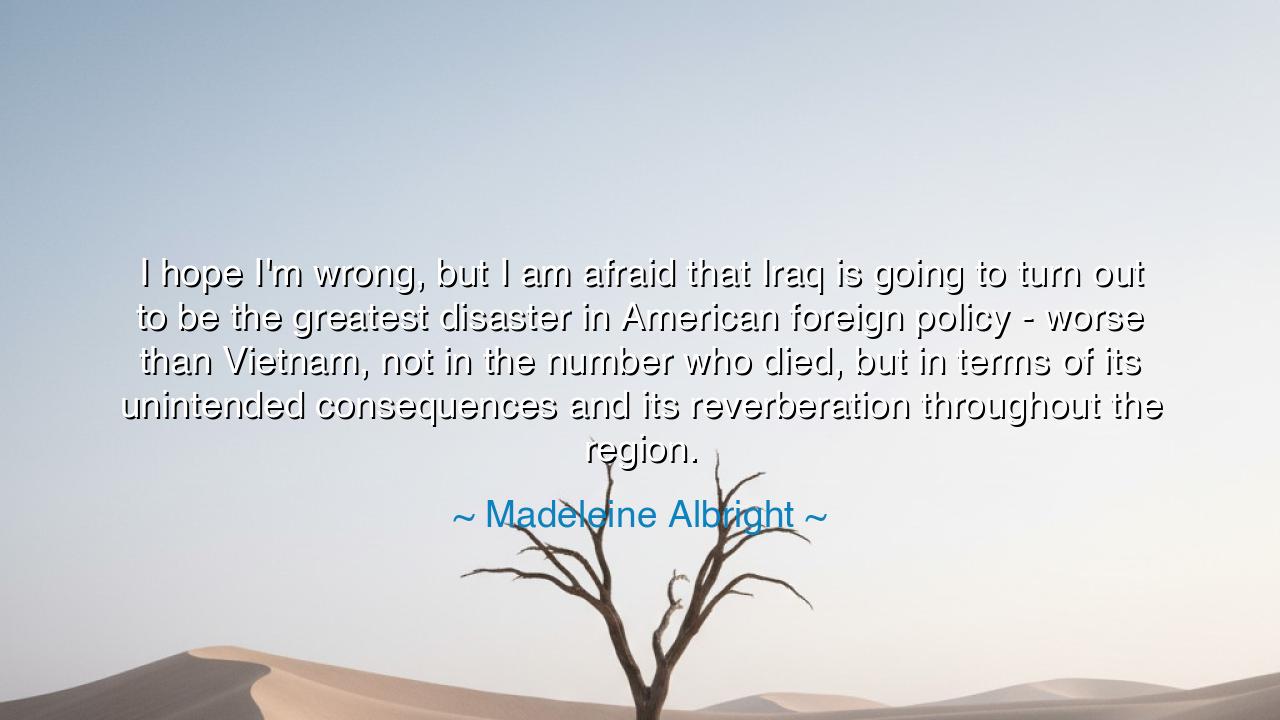
I hope I'm wrong, but I am afraid that Iraq is going to turn out
I hope I'm wrong, but I am afraid that Iraq is going to turn out to be the greatest disaster in American foreign policy - worse than Vietnam, not in the number who died, but in terms of its unintended consequences and its reverberation throughout the region.






When Madeleine Albright, a woman of sharp intellect and tempered heart, uttered the words, “I hope I’m wrong, but I am afraid that Iraq is going to turn out to be the greatest disaster in American foreign policy — worse than Vietnam, not in the number who died, but in terms of its unintended consequences and its reverberation throughout the region,” she spoke as a seer gazing upon the gathering storm. Her words were not born of cynicism, but of deep sorrow — the sorrow of one who had seen empires rise upon good intentions and fall beneath the weight of their own hubris. She foresaw that power, when wielded without foresight or humility, becomes a curse upon both the victor and the vanquished.
To understand her warning, we must first recall the world that shaped it. In the early years of the new century, the United States stood unmatched, radiant with confidence after the Cold War’s end. Its leaders, driven by fear and faith, sought to reshape the Middle East in the image of their own ideals. Yet as Albright knew well, the world cannot be remade by force alone; nations are not clay to be molded but living spirits bound by history, faith, and memory. The invasion of Iraq, though begun with proclamations of liberation, awakened forces older and darker than any government could control. What began as a war for peace became a crucible of chaos, birthing divisions that echoed through generations.
Her words carry the same gravity as those of Cassandra of Troy, the prophetess cursed to speak the truth and never be believed. Albright, too, saw the fire before it fell. She understood that the truest tragedies in history are not measured in numbers of the dead, but in the unintended consequences that live long after — in the bitterness sown, in the hatred reborn, in the trust that withers between peoples. The reverberations throughout the region, as she foresaw, were not mere political tremors, but the shaking of entire civilizations. Borders would bleed, extremism would fester, and the very meaning of “liberation” would grow hollow in the mouths of those who suffered beneath its name.
Look to the past, and the pattern repeats like the turning of the seasons. Rome once believed it could conquer the world in the name of order and virtue. Yet its legions, marching with banners of peace, left deserts in their wake. The Vietnam War too, born of conviction and fear, became a mirror reflecting the folly of might untempered by understanding. Nations, like men, fall not when they are weak, but when they believe themselves infallible. Albright’s voice was a torch held high in warning: that even the strongest empire must bow before the ancient law of consequence.
In her lament, there is not only condemnation, but deep compassion. For she knew the hearts of soldiers who fought believing they served justice, and the pain of families who buried their sons in foreign soil. Yet beyond grief lies the greater tragedy — the loss of wisdom, the failure to learn from the past. The disaster she feared was not merely the war itself, but the blindness of nations repeating the same errors under new banners. For when memory fades, folly returns clothed in fresh conviction.
From her words, a lesson rises for every generation that follows: power without humility is ruin. Before a nation draws its sword, it must ask not only, “Can we?” but “Should we?” Before a man acts in certainty, he must remember that every deed, however noble its intent, casts a shadow. The wise do not act to control the world; they act to understand it. For understanding births peace, but arrogance begets endless war.
And so, let these words echo across the ages: beware the righteousness that blinds, the confidence that silences doubt, the ambition that forgets the cost of its own reflection. For every war begun in pride becomes a chain binding the generations to come. If we would honor the wisdom of Madeleine Albright, we must learn to listen not only to the thunder of victory, but to the quiet warnings of conscience. Let us be a people who seek understanding before conquest, compassion before command — for only then shall the reverberations of our deeds be not of destruction, but of peace that endures beyond the echo of war.






AAdministratorAdministrator
Welcome, honored guests. Please leave a comment, we will respond soon